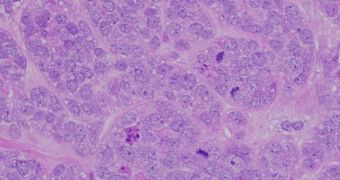Investigators with South Texas Accelerated Research Therapeutics in San Antonio, Texas, led by associate director of clinical research Amita Patnaik, MD, revealed in a study that a new oral drug holds great promise for addressing metastatic breast cancer in women. The compound works particularly well on patients with the HR-positive version of the disease.
There are encouraging results, because HR-positive tumors are present in 80 percent of breast cancer cases. The drug, called LY2835219, works by inhibiting cyclin-dependent kinases (CDK) 4 and 6, the team reports. In Phase I clinical trials, the chemical was used on its own, without being administered in combination with other anti-cancer medication.
Details of the study were presented on Sunday, April 6, at the annual meeting of the American Association for Cancer Research (AACR), which is being held April 5-9 in San Antonio. The START team says that the evaluations they have conducted to date are preclinical in nature, but already show some very encouraging results.
Significant potential therapeutic applications exist for LY2835219 in hormone receptor-positive women who exhibit aberrant CDK-4/6 pathways that accelerate cancer cell growth, the group goes on to say. Statistically, the new drug appears to act very efficiently on these cells, although the team is the first to admit that additional studies are needed to improve these interactions.
“When tested on various breast cancer types in preclinical studies, HR-positive cells were found to be highly sensitive to this drug. This is very encouraging, and warrants the initiation of future clinical trials in this setting where treatments are needed,” Patnaik explained.
“Although our study was not designed to compare patient outcomes based on HR status, the clinical benefit rate was 61 percent in our patients with HR-positive breast cancer, which means patients had disease control for longer than 24 weeks or had their tumors reduce in size by more than 30 percent,” the expert went on to say.
In a series of experiments the team conducted, 132 patients featuring 5 different types of tumors were administered LY2835219 as a sole medication once every 12 hours, for a total of 28 days. Treatments only concluded if the tumors regressed or if the patients experienced significant side-effects. Some 47 of the original group of 132 test participants were diagnosed with metastases before the study began.
The team says 36 of the 47 patients with metastatic breast cancer had the HR-positive version of the condition. At the end of the study period, 51 percent of people in this group had stable disease, 19 percent displayed a partial response, and 11 patients got worse despite treatment.
“These results indicate antitumor activity of LY2835219 in patients with HR-positive metastatic breast cancer, and the drug warrants further evaluation in larger, confirmatory studies,” Patnaik concludes.

 14 DAY TRIAL //
14 DAY TRIAL //